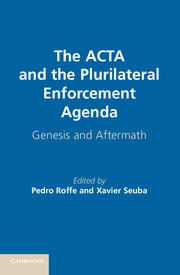Book contents
- Frontmatter
- Contents
- List of Contributors
- Foreword
- Acknowledgments
- Acronyms
- Introduction
- PART I THE FINAL ACT: ITS MAIN FEATURES AND CONTENTS
- PART II DOMESTIC LEGISLATIVE CHALLENGES
- PART III IMPACT ON RELATED PROCESSES
- PART IV VIEWS FROM STAKEHOLDERS: LESSONS
- 17 Lessons Learned from the ACTA Process
- 18 Lessons Learned from the ACTA Process
- 19 ACTA, a View from the Eye of the Storm
- 20 ACTA, the EU, and Economic, Social, and Cultural Rights in the Digital Environment
- PART V WHAT LIES AHEAD ACTA
- Annex I Anti-Counterfeiting Trade Agreement
- References
- Index
19 - ACTA, a View from the Eye of the Storm
Published online by Cambridge University Press: 05 December 2014
- Frontmatter
- Contents
- List of Contributors
- Foreword
- Acknowledgments
- Acronyms
- Introduction
- PART I THE FINAL ACT: ITS MAIN FEATURES AND CONTENTS
- PART II DOMESTIC LEGISLATIVE CHALLENGES
- PART III IMPACT ON RELATED PROCESSES
- PART IV VIEWS FROM STAKEHOLDERS: LESSONS
- 17 Lessons Learned from the ACTA Process
- 18 Lessons Learned from the ACTA Process
- 19 ACTA, a View from the Eye of the Storm
- 20 ACTA, the EU, and Economic, Social, and Cultural Rights in the Digital Environment
- PART V WHAT LIES AHEAD ACTA
- Annex I Anti-Counterfeiting Trade Agreement
- References
- Index
Summary
Introduction
On 4 July 2012, the European Parliament voted against the Anti-Counterfeiting Trade Agreement (ACTA). The vote was groundbreaking both in terms of substance, and because it was the first time the European Parliament used its consent procedure (Articles 207 and 218 TFEU) on an international trade agreement. The Parliament’s rejection of ACTA has led to critical reflections, mostly by those who would have liked to see the treaty pass.
As a member of the European Parliament closely involved with ACTA in the International Trade Committee, and as a defender of digital freedoms, I argue that those who sought the dismissal must also reflect. While “anti-ACTA” networks happily recalled and celebrated the victory, there are lessons to be learned from the whirlwind that swept through European capitals and EU institutions.
Beyond the surface and the headlines, I want to explore the broader social and political context in which the Parliament’s consideration and, ultimately, its vote on ACTA took place. This should shed light on the challenges we can expect in the future when seeking to preserve digital freedoms while pursuing an ambitious trade agenda.
A Brief History
Official negotiations on ACTA began in Geneva in 2008 and took place behind closed doors, based on coni dential or secret draft texts as is common practice for all trade agreements given their potential market impact. The information that was publicly available came through leaked negotiating texts published on WikiLeaks and other online platforms.
- Type
- Chapter
- Information
- The ACTA and the Plurilateral Enforcement AgendaGenesis and Aftermath, pp. 291 - 298Publisher: Cambridge University PressPrint publication year: 2014



